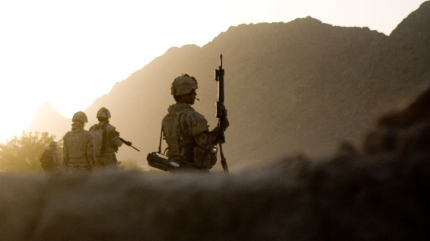
Canadian soldiers with the 1st RCR Battle Group, the Royal Canadian Regiment, patrol in the Panjwaii district near Salavat, southwest of Kandahar, Afghanistan, early Thursday morning, Sept. 9, 2010. (AP / Anja Niedringhaus)
By Mike Blanchfield, The Canadian Press, Nov. 7, 2010
HALIFAX – The Harper government is considering a proposal that would keep hundreds of Canadian troops in Afghanistan until 2014 in a non-combat, training role, The Canadian Press has learned.
The move would extend Canada’s military presence in Afghanistan three years past the July 2011 withdrawal deadline set by Parliament, but would remove troops from the front lines of fighting.
It is under consideration because the Conservative government faces international pressure — publicly and privately — to leave behind at least a contingent of military trainers to help address a shortfall in the NATO-led mission.
Well-placed sources have told The Canadian Press they expect Prime Minister Stephen Harper to make a decision soon on a proposal that would send up to 600 troops to Kabul to continue NATO training efforts. The Canadian personnel would not be involved in combat operations.
“Regardless of Afghanistan, Canada has an obligation to NATO,” said one of the sources, adding it would be “inconceivable that the prime minister would not take that into consideration.”
Sources say Harper could make a decision as early as this week in order to take the issue off the table before he attends the NATO leaders’ summit in Lisbon, Portugal on Nov. 18.
John Manley, the former Liberal deputy prime minister who headed Harper’s independent panel on Afghanistan, confirmed in an interview that he had been briefed on the proposal. He said the training mission is a good fit for Canada after so many hard years of fighting in Kandahar.
“I think it’s the right thing. It would be unfortunate to take everybody out and say, ‘That’s done.'” said Manley, whose panel paved the way for the parliamentary extension of the combat mission to 2011.
The House of Commons motion calls for Canada’s current contingent of 3,000 military personnel to cease combat operations next year in the volatile southern province of Kandahar, and Harper has made it clear there will be no extension.
But pressure has been mounting inside Canada and in the international community for the government to more clearly define its post-2011 plan for Afghanistan. The Liberal opposition, which favours a training role, has called for a parliamentary debate.
Until now, the Conservative government has only said that Canada’s diplomatic and development efforts would continue into the future.
Indeed, in January, Harper asserted that Canada’s involvement in Afghanistan would become “strictly a civilian mission” after July 2011. He said the post-combat role would involve humanitarian, development and diplomatic activity but that there would be no military presence “other than the odd guard guarding an embassy.”
However, Harper spokesman Dimitri Soudas confirmed Sunday the government is now “considering the options to provide aid, development and behind-the-wire training in a non-combat role.”
One source said that even though the Canadian public’s appetite to keep soldiers in Afghanistan may not be as strong as it once was, the fact that Liberal Leader Michael Ignatieff backs a training role for the military should offer Harper some political cover.
Liberal sources said Foreign Affairs Minister Lawrence Cannon broached the idea of a post-2011 training mission with Liberal foreign affairs critic Bob Rae over the weekend. The discussion was general and Liberals are awaiting the details before committing to support the move.
In addition to a continuing role in training, development and aid , Liberals are likely to insist that the government appoint a special envoy to Afghanistan to boost diplomatic efforts.
Even with Liberal support, the proposal will likely get a rough ride in the Commons. NDP Leader Jack Layton signalled Sunday his party’s opposition to any continued role for Canada’s soldiers Afghanistan.
“It would appear that Mr. Harper and Mr. Ignatieff are engaged in backroom negotiations to extend the military mission in Afghanistan,” Layton said in an email.
“We need leadership on the next steps in Afghanistan and what we have here is the same tired approach. Let’s end the military mission as was promised and support diplomacy, development and governance.”

